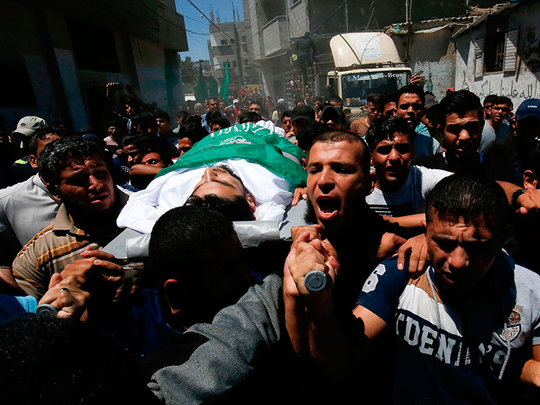
GAZA: Israeli occupation forces shot and killed two Palestinians, one of them a 14-year-old boy, and wounded 415 others with live fire and tear gas during protests along the Gaza border on Friday, Gaza health officials said.
Gaza medical officials said the boy, Yasser Abu Al Naja and Mohammad Al Hamayda, 24, were hit by live bullets. They added that four other men wounded by live fire were in critical condition.
The Israeli occupation military said in a statement that troops had used “large amounts of riot dispersal means”. In some cases, when the non-lethal means proved ineffective, live fire was used “in accordance with the standard operating procedures”.
It said the reported death of the boy would be investigated and that legal action could be taken, if appropriate.
Gaza officials say Israeli occupation troops have killed at least 135 people since the weekly protests began on March 30.
Palestinians say the protests are a popular outpouring of rage against Israel by refugees demanding the right to return to homes their families fled or were driven from on Israel’s founding 70 years ago.
Tens of thousands took part when the protests were launched at several locations along the Gaza border but the number has dropped significantly in the past few weeks and only a few thousand have participated more recently.
Israeli regime’s deadly tactics have drawn international condemnation. But support has come from its main ally, the United States, which like Israel, has cast blame on Hamas.
Israel maintains a naval blockade of Gaza and tight restrictions on the movement of people and goods at its land borders. Egypt has also kept its own Gaza frontier largely closed. Both countries cite security concerns for the measures, which have deepened economic hardship.
Bleakest period yet in occupied Palestinian Territory: UN rights expert
UNITED NATIONS: Reports of the indignities faced by people in the occupied Palestinian Territory have painted the bleakest picture yet of the human rights situation there, a United Nations expert has said.
UN Special Rapporteur Michael Lynk was in Amman, Jordan, this week where he met with civil society and other representatives to gather information for his latest report, which will be presented to the General Assembly in October.
Lynk monitors the human rights situation in the occupied Palestinian Territory but has been prohibited by Israel from travelling there.
“This is my third mission to the region since I assumed the mandate in May 2016, and the reports I received this week have painted the bleakest picture yet of the human rights situation in the occupied Palestinian Territory,” he said in a statement issued on Friday.
The rights expert listed concerns such as Israeli colony expansion in the West Bank and the ongoing crisis in Gaza.
Lynk also reported that the situation continues to worsen in Gaza, which has been crippled by a blockade for more than a decade.
Furthermore, an electricity crisis that began last June has yet to be resolved.
“After years of creeping Israeli de facto annexation of large swathes of the West Bank through settlement [colony] expansion, the creation of closed military zones and other measures, Israel appears to be getting closer to enacting legislation that will formally annex parts of the West Bank. This will amount to a profound violation of international law, and the impact of ongoing settlement [colony] expansion on human rights must not be ignored,” he said.
“Residents are deprived of their most basic rights, including the rights to health, to education, and most recently, in attempting to exercise their right to freedom of expression and peaceful assembly, they were deprived of the right to life,” he said, referring to recent demonstrations along the border fence, in which more than 100 Palestinians were killed and thousands wounded.
The UN expert was also worried about how funding cuts will affect the work of UNRWA, the UN agency that assists Palestinian refugees.
Nearly one million people in the Occupied Palestinian Territory depend on it for health care, education and social services.












